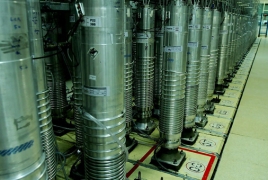
IAEA Director General Rafael Grossi stated that recent Israeli and U.S. strikes on Iran’s nuclear facilities have significantly set back the country’s nuclear program.
“I believe Iran’s nuclear program has been seriously pushed back… There was one kind of nuclear Iran before June 13, and now there’s another. That’s a major shift,” Grossi said, as reported by RIA Novosti.
However, he avoided giving a precise estimate of the extent of the setback.
Grossi also expressed hope that negotiations might resume. “I personally hope for renewed talks with [U.S. Middle East envoy] Witkoff. There was a proposal under which Iran would cease enrichment and instead participate in an international consortium. Very interesting options were under discussion,” he said.
Iran and the United States held five rounds of negotiations, mediated by Oman, on Tehran’s nuclear program and U.S. sanctions relief. The sixth round, scheduled for June 15, was cancelled following the Iran-Israel confrontation, for which Tehran blamed Washington.
Israeli Prime Minister Benjamin Netanyahu, in a televised address, declared that Israel had achieved a “historic victory” in the confrontation with Iran.
“We have achieved a historic victory that will be remembered for generations. We have eliminated two existential threats—the threat of nuclear annihilation and the threat of 20,000 ballistic missiles,” Netanyahu said, as reported by TASS.
He added, “We have frozen Iran’s nuclear program, and if anyone tries to revive it, we will act with the same determination and force to stop them. Iran will not possess nuclear weapons.”
Iranian President Masoud Pezeshkian, in a national address, said Israel had failed to achieve its goals and had suffered serious losses.
According to him, “the aggressive adversary failed to destroy Iran’s facilities or disrupt nuclear research, and failed to incite social unrest,” the Iranian presidential press service stated, as quoted by TASS.
Pezeshkian emphasized that Iran’s military response had shown the world the heavy cost of aggression against a major power like Iran.
The president expressed confidence in the possibility of peaceful coexistence among Middle Eastern countries. “Our collective wisdom and foresight will foil the plans of those trying to sow discord among us,” he added.
He also assured that all state institutions would focus on rebuilding the affected facilities and supporting the families of victims and those injured.
Israel launched a military operation against Iran on the night of June 13. Iran responded with counterstrikes. On June 22, U.S. forces entered the conflict, striking three nuclear facilities in Iran. On June 23, Iran launched missiles at the Al-Udeid airbase in Qatar, the largest U.S. base in the Middle East. According to U.S. authorities, there were no casualties or significant damage.
U.S. President Donald Trump announced that Israel and Iran have agreed to a complete ceasefire, now in effect.

